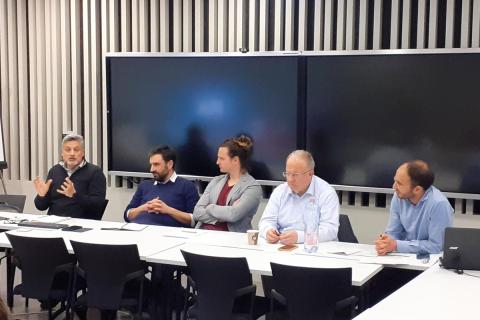Indirect Governance in the Middle East and North Africa – an international workshop organized by GIAS Fellow Dr. Youssef Mnaili

On May 9-10, 2023, IAS CEU hosted the workshop “Indirect Governance in the Middle East and North Africa.” The workshop took place as a central event within a project which aims to publish an edited volume in 2024. The project has been initiated and led by Dr. Youssef Mnaili, GIAS Fellow at IAS CEU, who invited senior and junior scholars with expertise in the MENA region to join as authors as well as participants in this workshop: Olivier Roy (EUI), Stephane Lacroix (Sciences Po Paris), Ammar Shamaileh (Doha Institute), Aboubakr Jamai (Institute for American Universities, Aix-en-Provence), Anil Duman (CEU); as well as young doctoral and postdoctoral researchers: Natalia Tellidou (EUI), Theo Blanc (EUI), Jakob Frizell (Bremen University) and Anastasiia Soboleva (CEU).
“The project”, Dr. Mnaili summarized, “compares the strategies used by ruling elites (governors) to enlist the assistance of third-party actors including religious authorities, local notables, and warlords (intermediaries) to carry out governance tasks on the ground that the governor lacks the capacity to perform on its own. The challenge for the governor is to exploit the competencies (the expertise, legitimacy, credibility, and operational capacity) of intermediaries without losing control of them. Principal-agent theory conceives of this as essentially a problem of information (hidden actions and intentions of the agent). Yet, as the contributions to the workshop and edited volume show, control is more fundamentally a problem of power. Even under perfect information it is tricky for governors to rely on capable intermediaries because the control these intermediaries have over outcomes of interest for the governor gives them power over the governor. Governors need to balance between leaving intermediaries full reign to develop their competences but lose control over them on one hand and taking back control from intermediaries by constraining their competence and making them artificially stupid (‘trained incompetence’) on the other hand.”
At the two-day closed encounter, authors presented their chapters and received extensive feedback from each other. The workshop concluded with a public panel discussion on "Political Islam: Two decades after the Arab Spring" with Professors Olivier Roy, Stephane Lacroix, Aboubakr Jamai, Dr. Theo Blanc, and Dr. Youssef Mnaili. The discussion focused on how "Islamists" have evolved from a dissident force to a significant protagonist in executive governments, and how they have adapted to their marginalization or repression.
